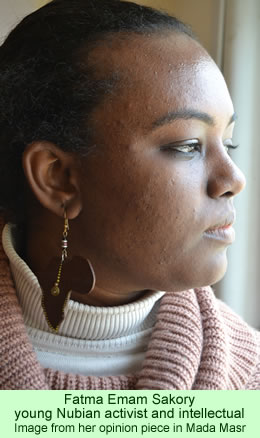The new Egyptian constitution, completed at the beginning of December, included a few political gains for the Nubians, but at least one young intellectual activist is not entirely satisfied. Fatma Emam Sakory, a freelance researcher and translator, was a member of the consultative office of Haggag Oddoul, the senior Nubian writer who represented the Nubians on the 50 member constitution writing committee. She expresses her views, with considerable candor, in an opinion piece published last week.
 Ms. Sakory makes it clear that the new constitution “does not match the dreams of my generation” but she does concede that it is probably the best that the Nubian community has achieved so far. Her article, published in the independent, online Egyptian newspaper Mada Masr, portrays her struggle to come to terms with her own Nubian ethnicity and its place in contemporary Egyptian society.
Ms. Sakory makes it clear that the new constitution “does not match the dreams of my generation” but she does concede that it is probably the best that the Nubian community has achieved so far. Her article, published in the independent, online Egyptian newspaper Mada Masr, portrays her struggle to come to terms with her own Nubian ethnicity and its place in contemporary Egyptian society.
She tells only her own story, but the interest of the piece is that it may represent the thinking and beliefs of many younger Nubians. She admits she does not speak the Nubian language. Her parents were born in Cairo and throughout her youth she avoided confronting her own identity.
Her memories of childhood were of her own Arabic speaking upbringing and of elderly relatives at family gatherings who preferred to converse in Nubian. She remembers a great grandmother telling her stories in Nubian, and while she didn’t understand what the old lady was saying, she loved to listen to her. Her father was in favor of Egyptian nationalism, supported the construction of the Aswan High Dam, and downplayed his Nubian heritage.
“Although every detail in my life screamed that I belong to the Nubian community, I shied away from engaging with Nubian activism,” she writes. That lasted until the revolution of January 25, 2010, when her life changed. She became a Nubian activist, met people in the Nubian Democratic Youth Union, and, through them, other young Nubian leaders.
Ms. Sakory writes that she quickly discovered that she had to struggle against discrimination because of her gender and her youth. She was nominated by the Youth Union for the 50 member constitution committee, but Haggag Oddoul was chosen as a compromise candidate. She felt honored to participate in his consultative support group.
She discovered the dissensions and differences within the ranks of the Nubian activists. Young people, for instance, many of whom, like her, could not speak Nubian, were avidly seeking the preservation and teaching of their language. Elders were struggling to maintain their positions of compromise and accommodation with the forces of the dominant society, against younger activists seeking to make new gains for the Nubian people. She gained an understanding of the complexities of the Nubian concerns.
There were numerous distressing aspects of the constitution writing process, such as the attitudes of Egyptian leaders toward Nubian issues. During discussions of the full committee, she felt the Egyptian leaders were dismissive—and too many Nubians were submissive—when confronting issues that the community was deeply concerned about.
When Sameh Ashour presided over a session of the committee discussing Nubian issues, he rarely allowed young Nubians to even speak, and he displayed an ignorance about their concerns that reflects the misunderstandings of many Egyptians about the Nubian community.
“Why do you ask for a right of return? Is there a land to return to?” he asked. He acted as if he were ignorant of the fact that the Nubians really don’t want to return to the land at the bottom of Lake Nasser. Many simply want to return to communities developed along the shores of the former Nile River, a demand they have been making many, many times. A session conducted by committee member Haggag Oddoul about Nubian issues only attracted 6 of the 50 members.
Ms. Sakory describes the politics within the Nubian movement—elderly leaders trying to maintain the minimal gains they made during the Mubarak era, versus younger ones attempting to forge new approaches to gaining rights for the people. She was angered, she admits, to read the opinions of some members of the Egyptian intelligentsia who claim that recognizing the Nubian language and heritage would somehow weaken national unity.
But she was pleased that the constitution did incorporate at least some articles that will recognize the Nubians and their rights. It prohibits discrimination on the basis of gender, race, color, religion, creed, ability, and geographical origin. Another triumph in the constitution is an article stipulating that development of remote areas of the nation, such as the Sinai Peninsula and Nubia, should be done in consultation with the people living in those regions.
But the Nubians also suffered losses in the document. They had hoped that Nubia would be recognized, in the preamble, as a constituent of the cultural mosaic of Egypt, but they did not gain that one.
Ms. Sakory is distressed that the constitution allows for military trials of civilians. She rejects the idea that the rights and actions of women are subject, in the constitution, to the understanding that they must not contradict the tenets of Sharia. She dislikes the fact that minority religious rights, such as those of the Baha’is, are not guaranteed, and that Muslim religious institutions still have the authority to intervene in public affairs.
She emphasizes that the views she expresses are entirely her own, but they are nonetheless worth careful study as possibly representing the forward thinking of younger Nubians and future leaders.